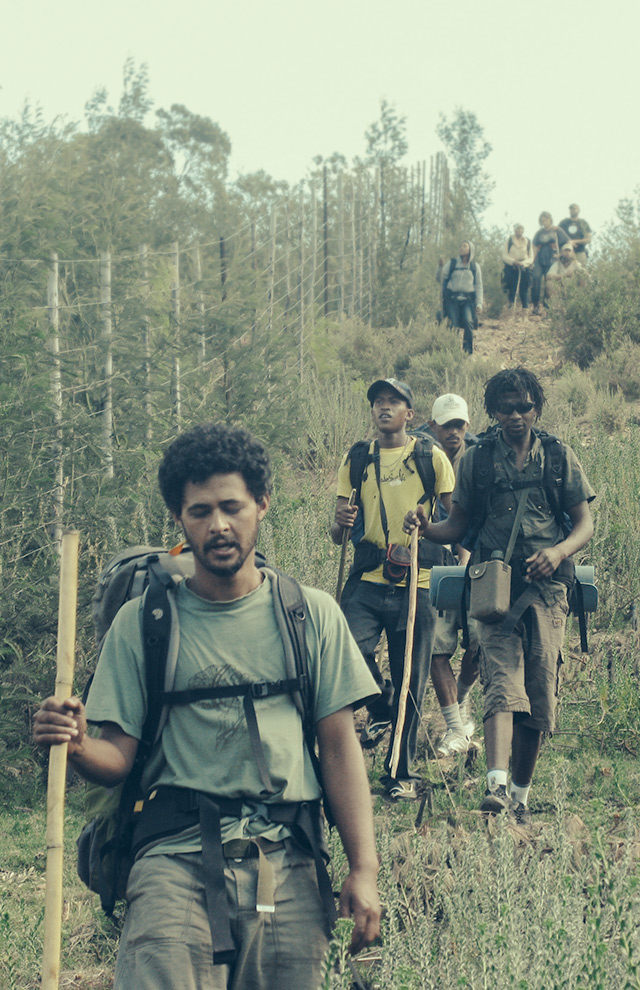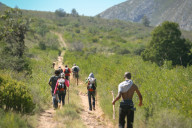Sustained nature connectedness is plagued by ‘the reintegration problem’. Why does the ‘magic’ encountered during our wilderness experiences disappear so quickly?
Dwight returned from an extended wilderness trail, his serene demeanour almost at odds with the blazing eyes that announced he was ready to change himself and the world. He knew he was now a different person: relaxed, confident, connected – and he felt committed in carrying this forward with him as returned to the ‘other’ life back home in the city.
But that never happened.
“As soon as you get back you forget about it all… I mean, you have thoughts about it but the thoughts become shorter and shorter until you forget them. We get wrapped up again in our lives, just rushing around trying to ‘make a living’.” 1
Clara lived on a ranch in the mountains for some months. It was a lifestyle that she felt so in tune with but it was the little things that would enrapture her. She liked to cool off by lying in a shallow stream, letting its gentle flow wash her thoughts and worries away. During these times, she felt at utter peace and full of love and gratitude to God and All that is.
 But it didn’t stay that way.
But it didn’t stay that way.
“Nowadays, I’m not feeling much connected with nature as I spend very little time in it…
Living in suburbia with a strange pace of life is taking it out of me.” 2
It is a familiar pattern and these kinds of stories you are likely to hear time and again.
In outlining core elements of the Vision Quest*, Stephen Foster and Meredith Little3 identify three distinct stages: severance, threshold and reintegration. These are also archetypal patterns that we might recognize on any personal journey of significance: leaving familiar spaces and shores, going to the edge of our comfort zones (physical or psychological, i.e. challenging our beliefs / perceptions) and then bringing newfound insight cocooned by our lived experience back to everyday life – with the vision of implementing it within ourselves and within our family, workplace or community.
Out on that journey, our personal insights and revealed truths seem unequivocal. We know. We have clarity and feel rejuvenated and alive. We rediscover motivation, a sense of purpose and a burning desire to initiate change when we return home. At the time, it seems clear and achievable – we hardly doubt ourselves.
But once returned, integrating and living all those radiant promises – those ‘true vows’ we made ourselves – is often an uphill battle. Life circumstances, everyday distractions, systemic barriers and stubborn habits dilute our ambitions, distort our clarity and gradually disband our resolve.
What goes so wrong?
It is well documented that the demands of urban living – replete with distracting artificial stimuli – place heavy demands on our physical and psychological well-being. Modern Westernized society itself is, for the most part, a system built on separation. But if we know – and have the capacity to recall – the power of those nature experiences why can’t we make nature more of a priority in our lives?
“Probably laziness, because these last few months I’ve been working 16 hours a day. Even weekends as well. But it’s laziness ‘cos I haven’t made time for it”, says Dwight.1
“Laziness” or, perhaps more accurately, lack of discipline and willpower, is a significant obstacle, especially when the pursuit of nature connectedness is not a norm among your everyday social circles. However, this is not the only hurdle for people wishing to make nature experience and connectedness habitual in their lives but instead find ourselves repeatedly ‘falling short’.
Research1 shows that awareness of one’s connectedness with nature immediately after a wilderness experience tends to fade over time. For shorter nature experiences, the feeling can wane even more rapidly. The personal barriers that people tend to identify as being problematic in their quest for sustained nature connectedness relate to feelings of: insignificance (“What I do [or want to do] won’t make a difference”); disempowerment in the face of institutional barriers (“The government or system doesn’t provide eco-friendly alternatives”) being too daunting or drastic (“I would need to change my lifestyle or give up my job”); inertia (“I am no longer sure if this right for me right now”); inadequacy (“I don’t have the know-how to initiate the changes I envisioned”); or lack of time (“I am simply too busy to make (more) time for nature”). But ultimately, at some point, prior to any action, there must be a conscious and decisive choice toward embracing personal responsibility for nature connectedness and pro-environmental behaviour.
It is important to recognize that meaningful nature experiences do create a spark, catalyze a passion or ignite ‘a remembering’ of our forgotten connections. They are perceived to be positively linked with reported changes in environmental behaviour or at least a stronger ownership of social-ecological problems and solutions1,2
Constant reminders or follow-up visits to ‘nature out there’ may therefore be needed to rekindle the level of awareness attained during our past nature immersion experiences. Even if not ‘out there’, simple eco-literacy activities ‘here’ around one’s home and garden may be enough to retrieve the displaced feelings and bolster motivations. Like any pathway toward forming new habits, this reinforcement helps to maintain the cycle of positive feedback by providing direct opportunity to (re)experience and reinforce one’s sense of connectedness with nature.1
The Flipside
Some years ago, when interviewing an environmental educator on how he approached follow-up activities with historically disadvantaged children from urban townships, he acknowledged that for his organization’s purposes,
“We aim to make that experience here, that ‘one time’ experience. They [the kids] come to us and they leave. But I think the idea is to make a hell of an impact. Once. If you do something too often, it becomes jaded. You can go kite surfing. Or you can go snowboarding. Or you can do something 10 times. But there is always that one time that you remember. All the rest are just superfluous. It is that one time, they remember…And when you have done the camp. And somebody turns around, a child, when it is time for them to go home, and the child turns around to you with tears in his eyes and says, “I don’t want to go home”, that’s an experience…that’s an experience. And that’s why I do, what I do.” 2
There is no doubting this educator’s commitment and one could not help but admire his passion and enthusiasm for the children he leads into nature. And indeed those one powerful experiences can have a positive and catalytic impact …but could there be a less desirable and unintended kickback over the longer term?
One wilderness guide interviewed holds sincere concerns for the ‘community trails’ which he leads into various South African wilderness areas. These outings, specifically for historically disadvantaged persons or young adults at risk, have an intensely powerful and positive effect on them when experiencing the ‘other-worldly’ wonders and peace of the wilds. But when they return home to their townships, they are cast back into persistent noise, violence and an environment which is often anything but ‘the safe container’ within which they were held and nourished by whilst in the bush. These are people who cannot just ‘escape’ to nature ‘out there’ on a weekend or next holiday to reconnect like many of us have the privilege of being able to do.
This lack of follow-up epitomizes ‘the reintegration problem’ .
However, what some of these materially impoverished folk do have is a richer cultural fabric and more authentic social connectedness which many of us in fast-paced separatist Westernized society increasingly lack or neglect. Supportive family and community can build resilience and create a vital (happiness) buffer in the face of external stressors. Utilizing or modelling traditional community structures as a basis for supporting nature connectedness may be vital in addressing ‘the reintegration problem’.










Be the first to share a comment